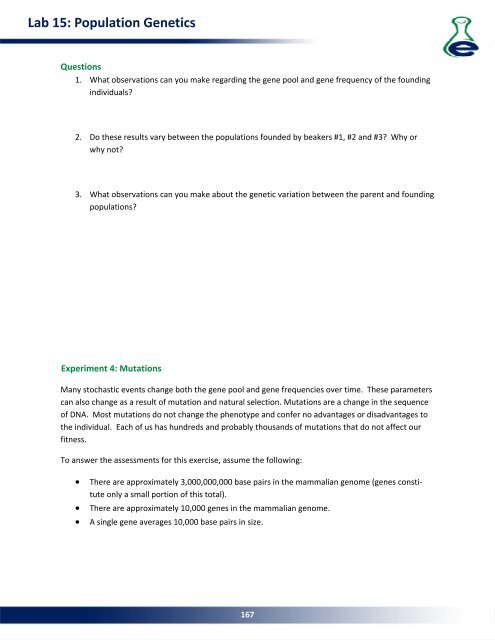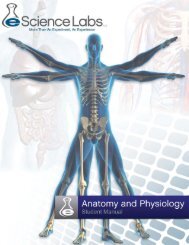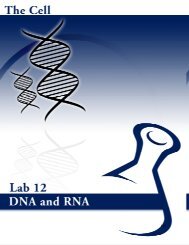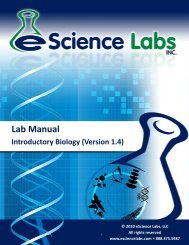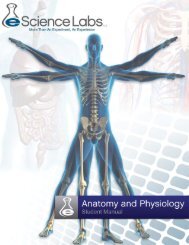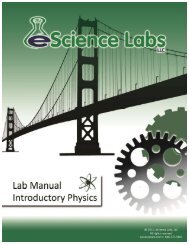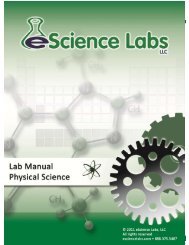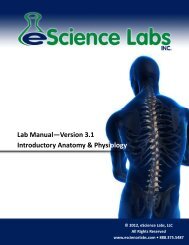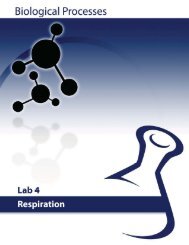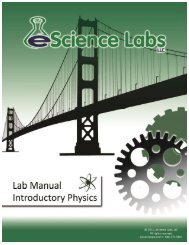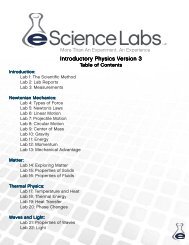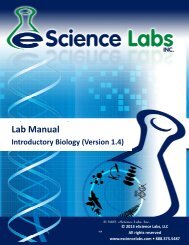- Page 1:
Lab Manual Introductory Biology (Ve
- Page 4 and 5:
Common Labware found in ESL Kits 4
- Page 6 and 7:
Performing the experiment Do not
- Page 8 and 9:
Lab 12: Meiosis Time: 1.5 hours Mat
- Page 10 and 11:
The Cell (continued): How Mutations
- Page 13 and 14:
Lab 1 : Scientific Method Concepts
- Page 15 and 16:
Lab 1 : Scientific Method Controlle
- Page 17 and 18:
Lab 1 : Scientific Method Speed (kp
- Page 19 and 20:
Lab 1 : Scientific Method 8. Interp
- Page 21:
Introduction Lab 2 Writing a Lab Re
- Page 24 and 25:
Lab 2: Writing a Lab Report the top
- Page 26 and 27:
Lab 2: Writing a Lab Report Table 3
- Page 28 and 29:
Lab 2: Writing a Lab Report 28
- Page 31 and 32:
Lab 3: Data Measurement Concepts to
- Page 33 and 34:
Lab 3: Data Measurement Length, Are
- Page 35 and 36:
Lab 3: Data Measurement Example: To
- Page 37:
Lab 3: Data Measurement Temperature
- Page 41 and 42:
Lab 4: Introduction to the Microsco
- Page 43 and 44:
Lab 4: Introduction to the Microsco
- Page 45 and 46:
Lab 4: Introduction to the Microsco
- Page 47:
Biological Processes Lab 5 The Chem
- Page 50 and 51:
Lab 5: Chemistry of Life ties. The
- Page 52 and 53:
Lab 5: Chemistry of Life Figure 3:
- Page 54 and 55:
Lab 5: Chemistry of Life mediately
- Page 57:
Biological Processes Lab 6 Diffusio
- Page 60 and 61:
Lab 6: Diffusion molecule to cross
- Page 62 and 63:
Lab 6: Diffusion Table 2: Diffusion
- Page 64 and 65:
Lab 6: Diffusion Experiment 2: Conc
- Page 66 and 67:
Lab 6: Diffusion Beaker 12. Again,
- Page 69:
Biological Processes Lab 7 Osmosis
- Page 72 and 73:
Lab 7: Osmosis There are three type
- Page 74 and 75:
Lab 7: Osmosis To test that no sol
- Page 76 and 77:
Lab 7: Osmosis 5. Osmosis is how ex
- Page 78 and 79:
Lab 7: Osmosis Table 3: Amount of w
- Page 81:
Biological Processes Lab 8 Respirat
- Page 84 and 85:
Lab 8: Respiration Membrane Anaerob
- Page 86 and 87:
Lab 8: Respiration Procedure 1. Com
- Page 88 and 89:
Lab 8: Respiration 6. Optional: Usi
- Page 90 and 91:
Lab 8: Respiration Table 3: Bromoth
- Page 93:
Biological Processes Lab 9 Enzymes
- Page 96 and 97:
Lab 9: Enzymes is the pocket where
- Page 98 and 99:
Lab 9: Enzymes 5. Make a serial dil
- Page 100 and 101:
Lab 9: Enzymes 4. Record the temper
- Page 102 and 103:
Lab 9: Enzymes bottle to avoid any
- Page 104 and 105:
104
- Page 106 and 107:
106
- Page 108 and 109:
Lab 10: Cell Structure & Function P
- Page 110 and 111:
Lab 10: Cell Structure & Function
- Page 112 and 113:
Lab 10: Cell Structure & Function F
- Page 114 and 115:
Lab 10: Cell Structure & Function 9
- Page 116 and 117: 116
- Page 118 and 119: 118
- Page 120 and 121: Lab 11: Mitosis G 2 : the second gr
- Page 122 and 123: Lab 11: Mitosis Experiment 1: Obser
- Page 124 and 125: Lab 11: Mitosis Table 1: Number of
- Page 126 and 127: Lab 11: Mitosis 4. How accurate wer
- Page 128 and 129: 128
- Page 130 and 131: Lab 12: Meiosis Meiosis:
- Page 132 and 133: Lab 12: Meiosis Experiment 1: Follo
- Page 134 and 135: Lab 12: Meiosis Meiosis II Prophase
- Page 136 and 137: 136
- Page 138 and 139: 138
- Page 140 and 141: Lab 13: DNA & RNA As a cell divides
- Page 142 and 143: Lab 13: DNA & RNA There are multipl
- Page 144 and 145: Lab 13: DNA & RNA Experiment 2: Tra
- Page 146 and 147: Lab 13: DNA & RNA cloth (the filter
- Page 148 and 149: 148
- Page 150 and 151: Lab 14: Mendelian Genetics The law
- Page 152 and 153: Lab 14: Mendelian Genetics Using ou
- Page 154 and 155: Lab 14: Mendelian Genetics Attentio
- Page 156 and 157: Lab 14: Mendelian Genetics c) What
- Page 158 and 159: 158
- Page 160 and 161: 160
- Page 162 and 163: Lab 15: Population Genetics 45.5% (
- Page 164 and 165: Lab 15: Population Genetics 5. What
- Page 168 and 169: Lab 15: Population Genetics Questio
- Page 170 and 171: Lab 15: Population Genetics 3. What
- Page 173 and 174: 173
- Page 175 and 176: 175
- Page 177 and 178: Introductory Biology Appendix Good
- Page 179 and 180: Appendix: Good Lab Techniques Good
- Page 181 and 182: Lab Appendix: 22: Plant Good Reprod
- Page 183 and 184: 183


